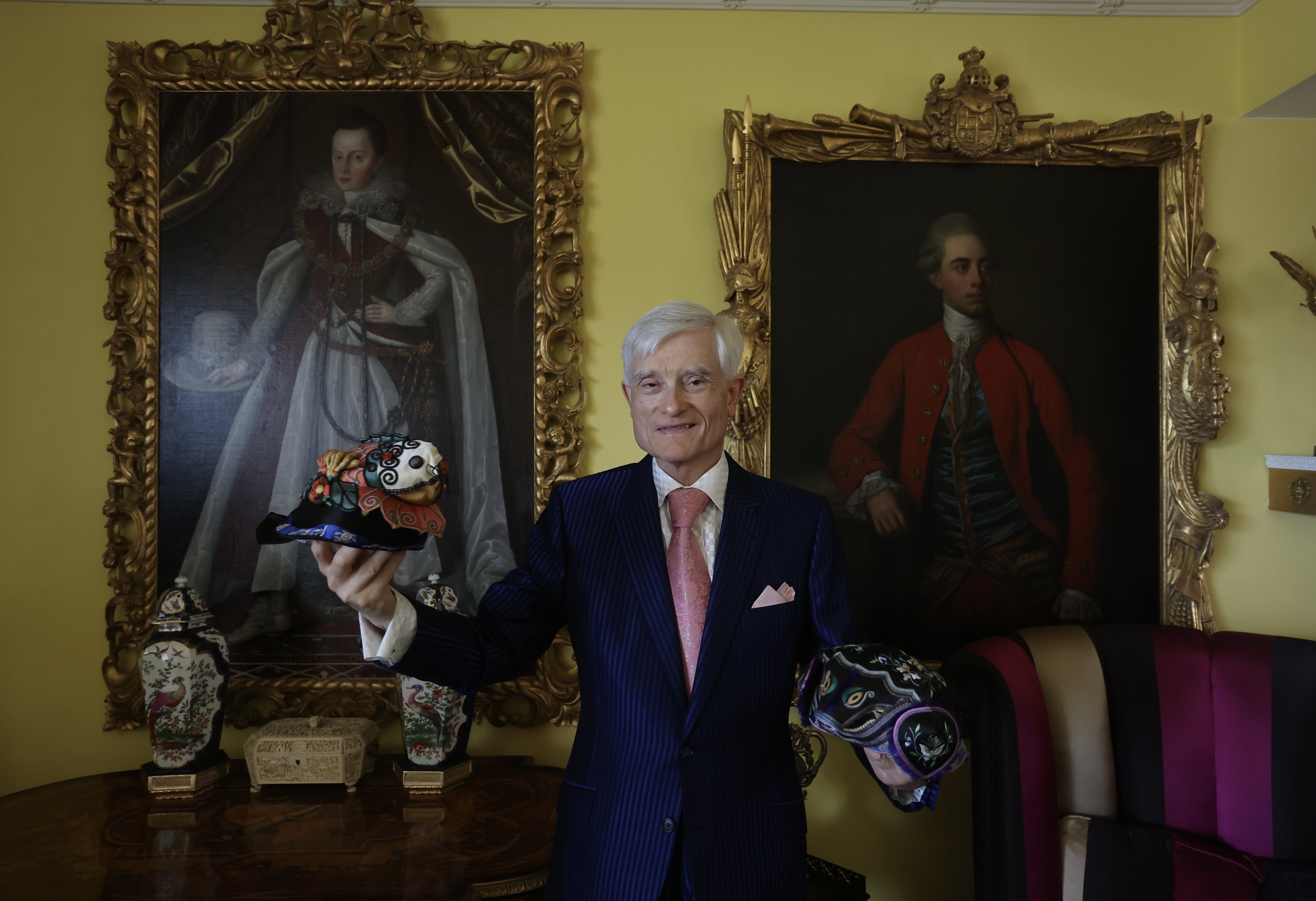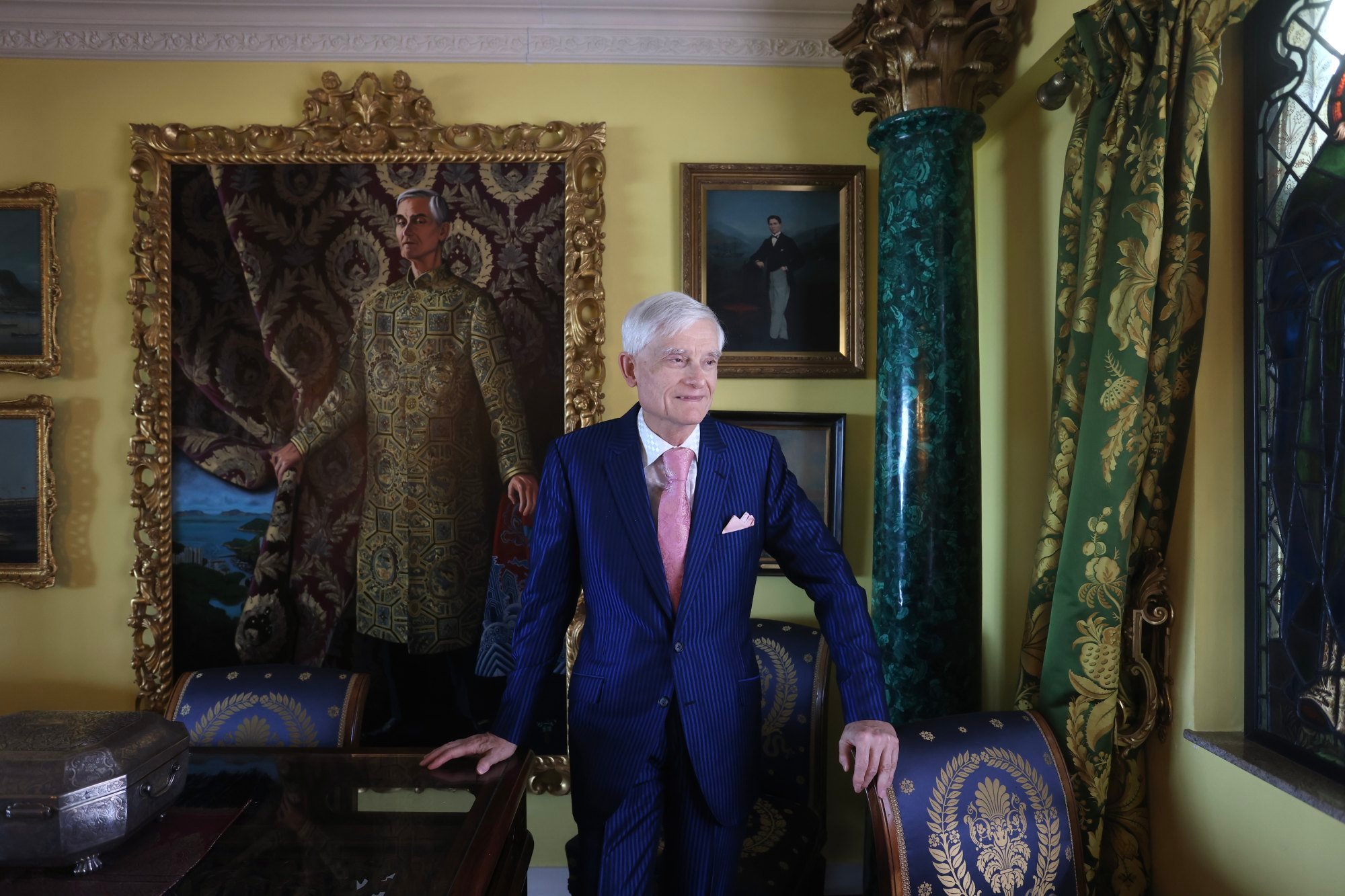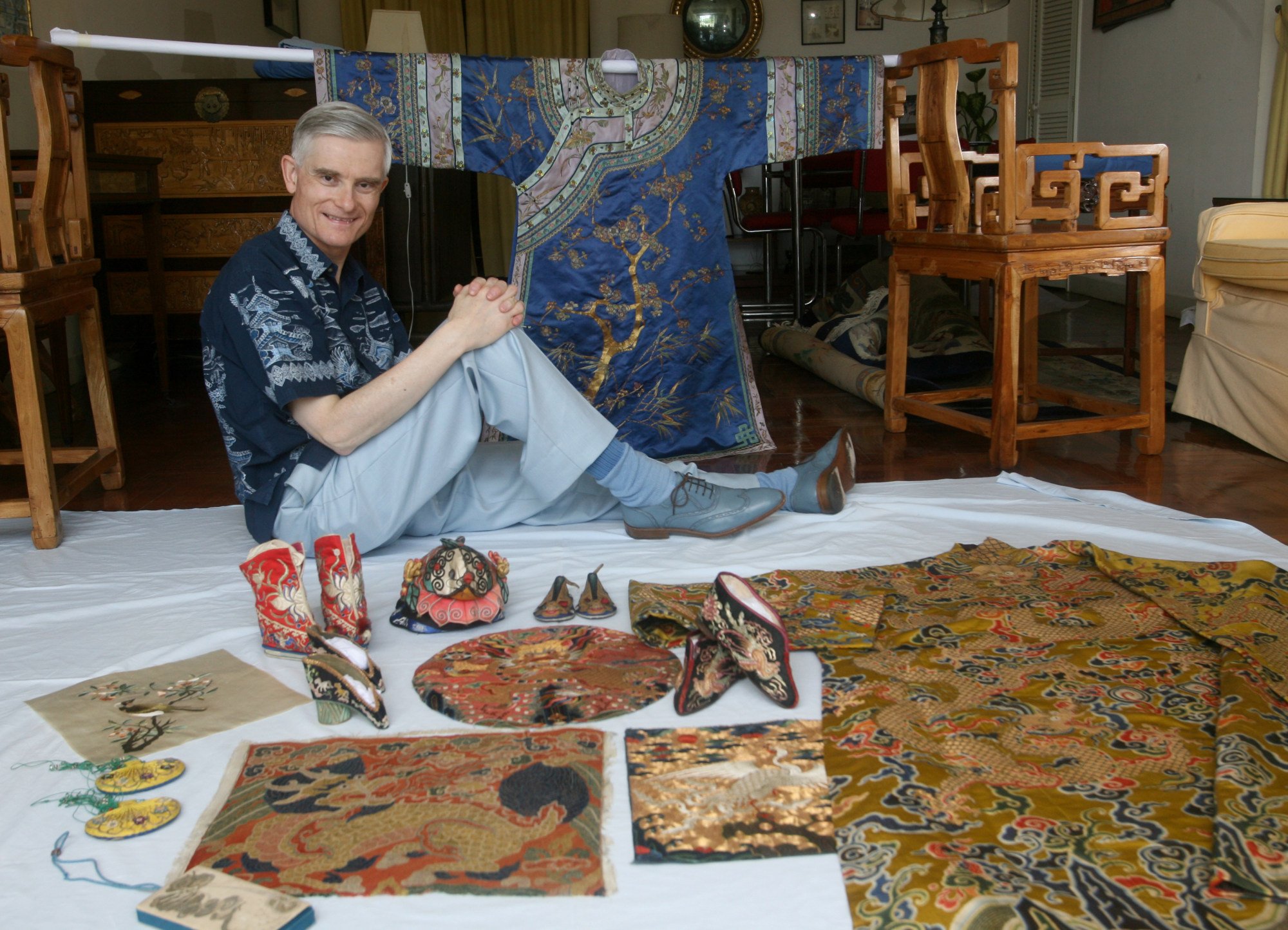
- When Chris Hall’s mother said ‘buy property’, he obeyed but bought Chinese robes too, and amassed a world-class collection. He recalls a globetrotting childhood
My father came from fairly humble origins – his father was a train driver – and he won a scholarship to a local grammar school in Yorkshire (in northern England), left at 15 and qualified as an accountant.
As a young man, he realised there were more opportunities in the British Empire, so he joined the Sudan government service in 1935. My mother was an Essex girl whose first husband was a qualified engineer.
Eventually she went back to England, got a divorce and they were married. Of course, it was a big scandal. The English are very conservative as a people, and the English overseas are even more conservative. My father was worried about losing his job.

The centre of social life was the club in Khartoum, the capital of Sudan, and the important occasion, I gather, was my mother’s first appearance as Mrs Hall, not Mrs Godfrey. It was the summer and the senior people and, more importantly their wives, were on holiday, so weren’t there to strongly disapprove.
My father kept his job; and two years later, in 1952, I appeared on the scene.
‘They were classified but what the hell!’: Naxos founder’s riveting journey
Game changer
In 1954, Sudan became independent, and the new government gave all the expatriate colonial officials two months’ notice. My father applied for the job of assistant bursar at the University of Hong Kong.
My mother loved Hong Kong. My father wasn’t so keen, then. Oh, the cricket was fine. But in the Sudan people didn’t work in the afternoon because it was so hot and in Hong Kong, he was expected to work after lunch …
When you’re young, you don’t have ‘a norm’ so you just accept whatever’s thrown at youChris Hall
Desert storm
My father was doing something he never stopped doing throughout his life – applying for a new job. Eventually he got one as bursar at Fourah Bay College, in Sierra Leone.
‘Hong Kong is my home’: composer Tan Dun on representing city through music
My mother went out there and I was sent to school in Bexhill-on-Sea (in East Sussex, southern England). I never much liked boarding school; I survived. I always much preferred to be at home with my parents.
The first time I flew to Sierra Leone – this would have been 1959, the Christmas holidays – I was seven. The journey took two days: Madrid, the Canary Islands, Bathurst (now Banjul) in the Gambia, then Freetown. An unfortunate stewardess was responsible for all the unaccompanied minors.
When you’re young, you don’t have “a norm” so you just accept whatever’s thrown at you. I inherited my mother’s slight frame but, fortunately, I inherited my father’s much more stolid character.
I always tell people I thought I might learn Cantonese by having a Chinese girlfriend with free lessons every evening. However, I’m still a bachelor and my Cantonese vocabulary is about 10 wordsChris Hall
Continental drift
We got out of Sierra Leone in 1962, before there were various coups d’état. My father found a job in Malta for 18 months. Unfortunately, my mother became depressed again, and my father got a job as finance officer at the new University of Malawi, where we lived for three years in a bungalow with 36 acres (15 hectares).
I was at Framlingham College in Suffolk (in eastern England), where I thought of myself as a white African. Then we came to Hong Kong in 1968, when my father, who was already 59, got a job as a treasury accountant with the Hong Kong government.
My early Cantonese had gone. I always tell people I thought I might learn Cantonese by having a Chinese girlfriend with free lessons every evening. However, I’m still a bachelor and my Cantonese vocabulary is about 10 words.
His Hong Kong cat photos went viral, so he took the idea to China
Economic growth
At school, I knew I wanted to do tax. I became interested when (the then-British prime minister) Harold Wilson increased taxes to 83 per cent on earned income and 98 per cent on unearned income. I looked upon that as expropriation.
In 1978, I started working in Hong Kong firms and now I have my own small consultancy business. I lived with my parents until they died. My father died in 2004 and my mother on Christmas Eve 2005.
I love colour so it became natural for me to collect textiles. The first robe I bought was from the late 19th century, at an auction in Hong KongChris Hall
Investment policy
I’m very interested in clothes. I was repressed at Framlingham; they had an absolutely horrible suit, prickly, it was ghastly. At Cambridge, I had a bright orange tweed jacket and tie.
I’ve been able to express myself more in the present century than the last. If someone’s “smart casual” is chinos and an open-necked shirt, and I turn up in a canary-yellow suit and a scarlet shirt with a black tie, it’s much more difficult to object. I’m dressed formally.
I love colour so it became natural for me to collect textiles. The first robe I bought was from the late 19th century, at an auction in Hong Kong. In 1980, I went to Beijing and bought several things in the government shops there. I had a bed made with three big drawers at the bottom, where I stored things, and a mattress on top, where I slept.
Adeline Ooi, Asia director of Art Basel, on her ‘out of the blue’ life
My parents were not interested. I remember there was a Ming Buddhist kesa – a priest’s robe – about nine feet (2.7 metres) long and a bit damaged. I had spread it out on my parents’ two beds and my father came in and said, “Take that rag off my bed.” I wasn’t upset. I could see it might be polluting.
My mother said, “You should focus on buying property.” Being a good son, I didn’t argue with her but, of course, I continued to buy textiles. Subsequently, she was very proud of what I had achieved.
I’d certainly put mine in the top 10 of all the world’s collections. I’ve got about 3,000 items; about 300 are on loan to the Asian Civilisations Museum, in Singapore, and part of the collection is on loan to the China National Silk Museum, in Hangzhou.
There are thousands of 19th century China export paintings; mine is a rare 21st century oneChris Hall
Self-preservation
I moved into my (2,800 sq ft or 260 square metre) flat in 2009. I added three more drawers to what had been my bed and that’s now the big platform in my textile room. Everything else – the English furniture, the William Morris stained glass, the Royal Worcester chinoiserie, the paintings – was bought for the flat.
My parents would have hated it; my mother liked simple things, not decoration. I like portraits and a friend said I should get one of myself, and an English artist, Paul Benney, came out to Hong Kong to paint it.
I’m in a robe I wear to museum openings and balls that’s made out of old Japanese obi material, in front of a curtain which was embroidered in India, with a view from my flat. There are thousands of 19th century China export paintings; mine is a rare 21st century one.

Bottom line
There are not many advantages of getting old but one of them is no longer worrying what people think about you. I wear what I want, I do what I want, I’m friends with the people I want to be friends with.
Nicolas Chow of Sotheby’s is a keen amateur photographer and he’s done books on people in their homes. For Chateau Chris Hall, he came round and photographed whatever took his fancy. He asked me to change outfits on several occasions and, eventually, to strip naked and get in the bath. So I now have a reputation as a porn star.
How silk is made, its history in China and farmers’ odd figure of worship
Journey’s end
Earlier this year, I went to Highgate Cemetery (in London) and had my photo taken with Karl Marx to show that my heart is on the right side because I do want to stay in Hong Kong, unless geopolitics make it impossible. I noticed all the neglected graves. If my parents had had a headstone, no one would have cared for it once I’ve gone.
As both my parents died at home in Hong Kong, the coroner was involved. When they’d sent back my father’s ashes, my mother and I scattered them at Deep Water Bay. But with my mother, I’d no interest in doing anything because she continues in my memory.
I told the coroner’s office I didn’t want her ashes back so presumably they’re in some landfill somewhere.
